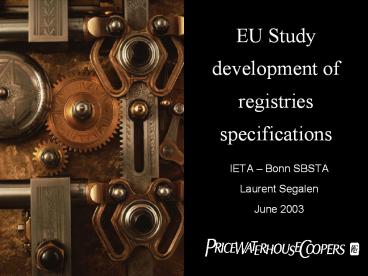EU Study development of registries specifications - PowerPoint PPT Presentation
1 / 13
Title:
EU Study development of registries specifications
Description:
Each party should take its own precautionary measures and conduct its own ... CPR applies only to Parties in the Kyoto Protocol, whereas the EU trading scheme ... – PowerPoint PPT presentation
Number of Views:49
Avg rating:3.0/5.0
Title: EU Study development of registries specifications
1
EU Study development of registries
specifications
- IETA Bonn SBSTA
- Laurent Segalen
- June 2003
2
Important Notice
- This presentation was prepared for the IETA Side
Event solely in order to explain the content and
timetable of the study referenced
ENV.E.1/ETU/2002/0014 which is being carried out
by CDC IXIS, PwC Baker McKenzie for the
European Commission and to draw the attention of
the Side Event to certain issues arising from
this study. - All views, opinions and statements in this
presentation are only those of PwC. No inference
should be drawn that any of the content of this
presentation represents in any form or substance
the opinion of the European Commission or of its
officers nor that any of the proposed schemes
herein have been or will be approved or validated
by the European Commission or its officers in the
context or otherwise of the above-mentioned
study. - Whilst every effort has been made by PwC to
ensure the proposals and schemes shown in this
presentation are well founded, no responsibility
in any form is assumed by PwC for any actions
that any parties may take with respect to any of
the proposals and/or statements and content in
this presentation. Each party should take its own
precautionary measures and conduct its own
verifications before basing any action or
decision in whatever context on any subject
contained in this document.
3
Prerequisites to functional technical
specifications
- The EU Directive concerns only legal entities.
- EU registries will be integrated with Kyoto
registries so that each national registry should
be able to handle both Kyoto allowances and
credits and EU allowances. - There will therefore be only one national GHG
registry for each MS. - Registries may be maintained in a consolidated
system (Art 19) - The ETL will be separate from the national
registries and or/ any consolidated system of
registries - Any person may hold allowances (Art 19)
3
4
Registries based on accounting tools
- Kyoto registries can be considered as accounting
tools - One of the main options we have considered so far
in this study is the use of the double-entry
book-keeping accounting method to account for
participants positions.
4
5
Functional specifications (1/2)
- The following functional specifications need to
be integrated into the workings of each national
registry - Creation of EAUs
- Initial Allocation
- Domestic Transfer
- International/Regional Transfer
- Freezing of transfers in absence of a
satisfactory report (Art 15) - Compliance/Retirement
- Cancellation
5
6
Functional specifications (2/2)5 key
macro-processes
- The management of registry accounts
- The issuance, allocation, cancellation,
retirement and eventual banking of allowances - The transfer of allowances and credits
- The assessment of compliance - reconciliation
between holdings of allowances and credits and
verified emissions - The production of reports
6
7
Key issue 1 proposed interface ETL / ITL
2005-2008
After 2008
REGISTRY A
REGISTRY B
X 7
ETL
X 7
REGISTRY A
REGISTRY B
X 7
X 7
X 7
ETL
ITL
8
Key issue 2 proposed numbering of EUA
Party of origin (ISO 3166 standard)
Vintage Indicates the year
Unit type 1AAU, 3ERU, 5CER
JI or CDM project identifier Unique consecutive
. For non JI or CDM0000
FR - 00 0 - 00 - 0000 - 000000000001 -
000000001000 - 03 - 097
End block
Issuance commitment period Pre-Kyoto are 00,
period from 2008-2012 will be 01, etc.
LULUCF activity This field is relevant to RMUs,
for all other instruments 00
Unique number 12 consecutive number enables
identification of instruments by block (Start)
EU tag (ISO 31661 standard) Shows that an
AAU/ERU/CER has been converted into an EU
allowance
9
Key issue 3 CPR
- Question Should the CPR apply to all legal
entities between 2005 and 2008 or should this be
consolidated at the EU level? - CPR applies only to Parties in the Kyoto
Protocol, whereas the EU trading scheme only
applies to legal entities (companies, etc.). - Consequence The CPR will not apply to legal
entities before 2008 but will have to be
respected by Parties from 2008 on. It remains to
be determined how the CPR will be applied to
legal entities from 2008.
9
10
Key issue 3 CPR
- Question Should the CPR apply to all legal
entities between 2005 and 2008 or should this be
consolidated at the EU level? - CPR applies only to Parties in the Kyoto
Protocol, whereas the EU trading scheme only
applies to legal entities (companies, etc.). - Consequence The CPR will not apply to legal
entities before 2008 but will have to be
respected by Parties from 2008 on. It remains to
be determined how the CPR will be applied to
legal entities from 2008.
10
11
Technical specifications key elements to consider
- IT Organization (Project Mgmt, Team, Hosting)
- Technical architecture (incl. web server,
application server, database server, LDAP
directory server, Exchange Module) - Communication standards (Exchange Protocols,
Authentification, Confidentiality) - User Management (Passwd, Security)
- Business Continuity (Availabity, Disaster,
Back-up)
11
12
Next steps
- Functional specifications draft delivered
discussed - Technical specifications draft delivered
- July / September draft framework completed
12
13
CDC IXIS - Heneage Legge-Bourke h.legge-bourke
_at_cdcixis.comBM - Anthony Hobleyanthony.hobley
_at_bakernet.com PwC - Laurent Segalen
laurent.segalen_at_fr.pwc.com































